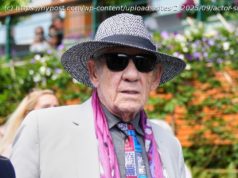The filmmaker Errol Morris defended his documentary at the Venice Film Festival from accusations that it helps normalize Mr. Bannon’s views.
VENICE — Stephen K. Bannon may have been dropped by the New Yorker Festival, but he’s currently a headliner at another. President Trump’s former chief strategist is the subject of “American Dharma,” an unflinching portrait by the veteran documentary maker Errol Morris that had its world premiere at the Venice Film Festival on Wednesday.
At a news conference, reporters raised concerns that by giving a platform to Mr. Bannon’s views Mr. Morris was helping to normalize them. Similar worries led The New Yorker to withdraw its invitation for Mr. Bannon to speak in October.
Mr. Morris said that Mr. Bannon’s views were crucial to understanding the state of America and the world, and that investigating them was not the same as supporting them.
Mr. Bannon was not an official guest of the Venice Film Festival, a spokeswoman for the event said, and he was not present at either the news conference or on the red carpet for the movie’s premiere. Variety reported that Mr. Bannon had slipped incognito into the main festival venue for the screening and watched it from the balcony, but he denied this in an email: “Didn’t see film here — saw it a couple of weeks ago — just came to do media if necessary,” he wrote.
In coming months, the film will also screen at the Toronto and New York Film Festivals, where it is likely to attract more attention than it has at Venice. Here, there were many free seats at the screenings, though Wednesday’s first official showing was met with enthusiastic applause and a minutes-long standing ovation for the director.
The 98-minute documentary is culled from 16 hours of interviews in which Mr. Bannon and Mr. Morris candidly discuss topics ranging from the 2016 presidential election and Mr. Bannon’s dismissal from the White House, to Mr. Bannon’s taste in movies. Mr. Bannon, a film buff and former movie producer, expresses admiration for John Ford, Orson Welles, Stanley Kubrick and even Mr. Morris himself.
At one point, they leave aside film aside to discuss literature. To Mr. Morris’s surprise, Mr. Bannon seems to endorse the sentiment expressed by Satan in John Milton’s “Paradise Lost”: “Better to reign in Hell than serve in Heaven.”
At a heated news conference on Wednesday, several journalists accused Mr. Morris of merely giving Mr. Bannon a megaphone for his views.
“Did I struggle with the question?” Mr. Morris said to a reporter who asked if he had been aware of that risk. “The answer is yes. If the question is am I still struggling with it, the answer would still be yes. My answer is to make this movie.”
“I think it’s frightening, but it’s great,” Zornitza Lubomirova, a journalist from Bulgaria said of the film. “I don’t think the film is problematic. People should know his point of view. I think it was balanced, as balanced as it can be.”
In an interview on Tuesday, Mr. Morris defended his film as an example of good reporting that doesn’t shy away from tackling divergent views. “The first job of journalism is to investigate,” he said. “It shouldn’t be pundits in a room saying things that they all agree with.”
Mr. Morris said Mr. Bannon had no editorial control over the film, although he did allow Mr. Bannon to see sections of it as it was being edited.
Of his interviewing style, Mr. Morris said, “I try to avoid questions like, ‘When did you stop beating your wife?’ because the idea is to create a situation where someone feels free to reveal themselves.”
“If an interview becomes purely adversarial, you often learn nothing,” he added.
Simply ignoring Mr. Bannon was not an option, Mr. Morris said.
“If I’ve done anything to help us understand who he is,” he said, “I don’t want to go overboard here, but I think it’s an important service. It’s part of what journalism should be doing.”






